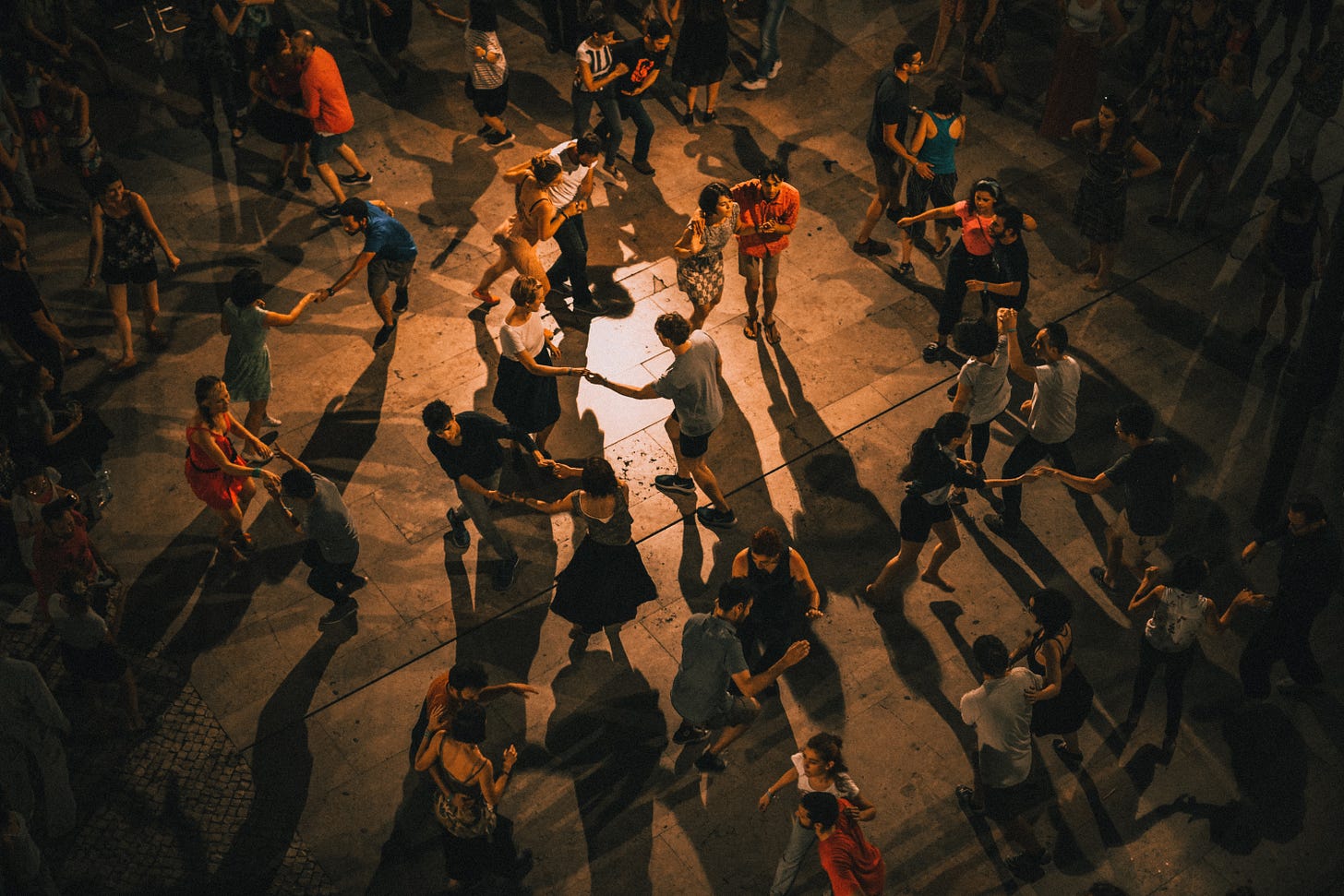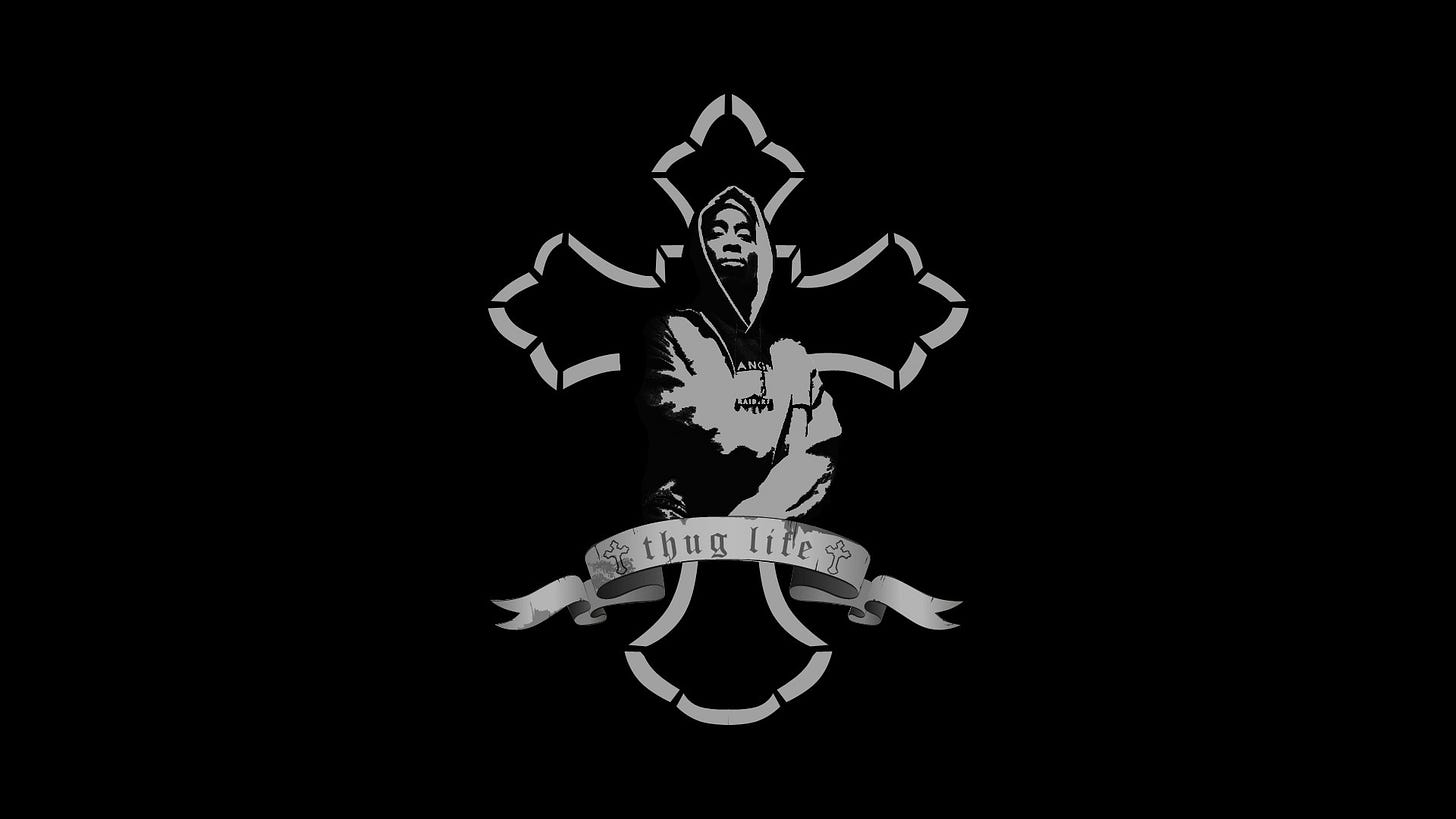What would 2Pac do? (part two)
After moving to California, Tupac Shakur ascended to nearly unparalleled fame. But how did he arrive at that vaunted position?
In the last edition of “What would 2Pac do?” I examined the early life and influences of Tupac Shakur (you can check that out here). For this next piece, I would like to examine Pac’s rise to prominence. What follows is part two of a three-part series on the life and music of Tupac Shakur.
(As an aside, I apologize for my delay in getting this out. The past two months have been trying, and this piece is a long one. Read at your own peril.)
Just as the Shakur family had fled the streets of New York for the allure of peace in Baltimore, they retreated in 1988 to what Afeni Shakur had pictured as a quaint, idyllic respite from crime—Marin City, California. But that little town, nestled beneath affluent settlements in the surrounding hills, was no such paradise: local cops had nicknamed it “The Jungle,” with its single main street, school, public-housing project, and store (for liquor). Crime was pernicious; Afeni fell victim to its byproduct through her worsening crack addiction. And, while she obfuscated the dire state of her dependency to Pac, conflict came to a head between the two. Tupac moved out and joined a few of his peers in squatting in an abandoned apartment.
Though Pac gained independence from his mother, he could not escape the influence of illicit drugs—Pac started dealing to support himself, along with various odd jobs. He found solace in the fraternity of the street life, a respite from the discord and chaos of his interpersonal life. He would later express this sentiment in one of his most famous tracks, “Dear Mama”:
They say I'm wrong and I'm heartless, but all along
I was lookin' for a father, he was gone
I hung around with the thugs
And even though they sold drugs
They showed a young brother love
I moved out and started really hangin'
I needed money of my own, so I started slangin'
Having moved to Marin City with one year left in his education, Tupac continued his studies over those wealthy hills at Tamalpais High School. The juxtaposition between Pac’s personal circumstances and those of his peers was jarring; Tupac later relayed in an interview with writer Kevin Powell that he was targeted for harassment by his peers. "It'd be the shitty, dumb n***as who had women, rides, houses, and I ain’t have shit… All through my time there they used to diss me… I got love but the kind of love you would give a dog or a neighborhood crack fiend… They liked me because I was at the bottom."
Rapping became an indispensable outlet for Pac. As graduation neared, Tupac started rapping more and attending school less, eventually eschewing his studies completely for his rhymes. After leaving school, he spent a brief stint with a family friend, Watani Tchyemba, in South-Central Los Angeles as a community organizer. But Pac was unsatisfied with the reminder of his mother in the political energy of Tchyemba and his colleagues, instead opting to return to Marin City and devoting himself entirely to rap. It was then that Tupac encountered a woman who would change his life: Leila Steinberg.
Leila was an accomplished singer and dancer, and a nascent but passionate devotee of hip hop. Like Tupac, she had been immersed in the struggle for racial equality in her early years. Though white, Leila was born the daughter of a criminal defense attorney in 1961—her father’s work informing her of the disparities of the criminal justice system—and she grew up in the Watts neighborhood of Los Angeles, well known for its prominent riots in 1965 over racial inequality. Too, Leila’s mother encouraged her to engage in social protest, especially in advocating for the rights of migrant farmworkers. Later, when Leila’s mother left to pursue social advocacy full-time, Leila entered into the world of music through her grandfather’s introduction of salsa, Brazilian, and Latin dances. Leila had quite the knack for dance and began performing.

Leila’s early adulthood saw her tour with various artists, including Carlos Santana’s band, and she married Bruce Crawford, a DJ who was inextricably intertwined with the Los Angeles and San Francisco rap scenes. She soon began hosting workshops on writing and performance for the underprivileged youth of the Bay Area. The summation of these elements of Leila’s background primed her for the irresistible allure of Tupac Shakur; their meeting was to be the catalyst for transformative growth in two young people.
A park in Marin City provided the setting for their first official introduction. Leila was sitting on the grass reading A Part of My Soul Went with Him by Winnie Mandela, which Tupac noticed and remarked, “Give me a break. What do you know about Winnie Mandela?” Now, Tupac stumbling upon Leila was likely no coincidence—she had connections in the music industry, and Pac was an enterprising individual—but their initial encounter proved mutually enchanting, regardless. Leila invited Tupac to her class, and, over the next few months, his presence usurped all else in her professional life. And soon their personal lives began to intertwine, too; after Tupac revealed the chaos of his home life, Leila suggested he become a part of her household. Leila soon grew into the stabilizing figure he needed for a brief but deeply nurturing moment in Pac’s life.
But the structure that Leila provided was not the only benefit of their relationship: Tupac offered insight into the person that Leila should become. She recalls this moment in an interview with NPR:
So, when I met Tupac, I had little girls and he was like, ‘How are you going to really parent and be the parent that you want to be and not the parent your mother was and run around in a band? You say you want to touch the world and you want to — you got to learn business. And I could be your first business.’ And so I was like, ‘That's crazy. I don't know anything — I'm not good at business.’
Although Leila doubted her business acumen, with Tupac’s help, she proved sufficiently adept to launch his career: Leila’s call with Atron Gregory, manager of a hit rap group called Digital Underground, lit the fuse on a career that would soon explode. And, as a token of his trust and appreciation, Tupac conferred his important papers and poems to Leila upon leaving her home. Many of them are published in The Rose That Grew from Concrete.
Tupac was a superstar in the making, and his stint with Digital Underground would serve as a launchpad. First hired on as a roadie and a backup dancer, Pac soon gained the opportunity to debut his emceeing skills—notably, under the newly minted moniker, 2Pac—on Digital Underground’s “Same Song,” released one day before his 19th birthday. Tupac’s first showing as a rapper on a major track was a good effort; his verse had a relatively pedestrian subject but impassioned command of the microphone and notable rhyming skills:
Now I clown around when I hang around with the Underground
Girls who used to frown, say "I'm down" when I come around
Gas me and when they pass me they used to diss me
Harass me, but now they ask me if they can kiss me
And the music video provided the world a first glance at the face of Tupac Amaru Shakur. Dressed as an African king and carried into the room by servants, Pac could hardly have chosen a more theatrical debut for his actor’s heart. His youthful exuberance carried an effervescent energy in just eight short bars; you could see a glow on his face and a playful energy. Pac was off to the races.
In 1991, Pac appeared with Digital Underground in Nothing But Trouble, starring Dan Aykroyd, Chevy Chase, John Candy, and Demi Moore. In their scene, Digital Underground is held up in traffic court and must perform “Same Song” to gain release. The energy of their performance becomes infectious, and soon the judge himself joins in.

Tupac’s time with Digital Underground—particularly through moments like “Same Song” and Nothing But Trouble—started to elevate his status as a rapper, and the stars began aligning for Pac’s first record deal. Tupac’s demo tape floated around industry players and ended up on the desks of Ted Field and Jimmy Iovine, founders of Interscope Records. Field was an heir to the Marshall Field retailing fortune and a television and film producer; Iovine was a legendary music producer and industry insider. Although Field and Iovine were heavy hitters in their respective areas of expertise, Interscope was a fledgling label when they signed Tupac in August 1991: it had opened up shop just two years prior. But the signing of Tupac and several other key players like No Doubt, Dr. Dre, and Snoop Dogg contributed to the label’s meteoric rise in the years to follow.
In November 1991, the fleetingly incipient solo career of 2Pac began with his debut in 2Pacalypse Now. 2Pac’s inaugural effort opens with “Young Black Male,” which features Pac spitting over a simple instrumental with a driving rock beat, à la Public Enemy. The lyrics emanate a mixture of bombast and social commentary, expounding on life while young and Black:
Young black male
I try to effect by kicking the facts
And stacking much mail
I'm packing a gat 'cause cops wanna jack
And fuck going to jail
'Cause I ain't a crook, despite how I look
I don't sell yayo
They judging a brother like covers on books
On another cut, “Soulja’s Story,” Pac begins to stir the controversy that would lead then Vice President Dan Quayle to publicly condemn the album:
Crack done took a part of my family tree
My momma's on the shit, my daddy split and moms is steady blaming me
Is it my fault, just cause I'm a young black male?
Cops sweat me as if my destiny is makin' crack sales
Only fifteen and got problems
Cops on my tail, so I bail 'til I dodge 'em
They finally pull me over and I laugh
"Remember Rodney King?" and I blast on his punk ass
Now I got a murder case...
In 1992, a Texas Highway Patrol Trooper was shot and killed by a man who was listening to “Soulja’s Story” at the time of being pulled over. The shooter claimed that rap music had fomented a hatred of police officers in him, and reactionaries took the bait. Tupac and Interscope were hit with a civil suit over the officer’s death that, while ultimately proving unsuccessful, mimicked the resistance that rappers faced in free expression.
The controversy surrounding 2Pacalypse Now was not an uncommon phenomenon for hip hop artists: Ice-T’s song “Cop Killer” was pulled from stores later in 1992 following a moral haranguing by political figures and police officers alike (George H. W. Bush and the Combined Law Enforcement Associations of Texas, respectively).
Yet, despite the contentious nature of the political response to 2Pacalypse Now, Pac’s solo effort debuted at the 64th slot on the Billboard 200 and had sold over 500,000 copies by April 19, 1995. It was a commercial success by all accounts—especially for an up and coming artist—but it was just a small taste of what was to come for Tupac Shakur.
Pac’s next big break came from a starring role in the 1992 movie, Juice. At the time, “juice” was a term in the inner cities of America for a sort of social capital relentlessly pursued by the young and powerless. In the lead role of Bishop, Tupac delivered a commanding performance and received critical acclaim for his magnetism. Tupac had transcended music to become a successful actor, and he was only 20 years old.
Following on the heels of his Hollywood fame, Tupac Shakur set out to navigate the waters of street activism; Pac launched T.H.U.G. L.I.F.E. (The Hate U Give Little Infants Fucks Everyone) to create an urban social movement. T.H.U.G. L.I.F.E. served as a confirmation of Tupac’s convictions for the advancement of Black people, but it also sealed his persona among the mainstream: while the acronym made sense to those who paid attention, too many saw it as proof of the gangsta personas of rappers. In hearing “thug life” without the context of the full meaning and Tupac’s intentions, Americans quickly indulged in stereotypes of men like Pac—that they were hoodlums who reveled in criminality.
While Tupac’s intentions were pure—to heal rifts between the Black community and prevent black-on-black violence—the moniker of T.H.U.G. L.I.F.E. prevented mainstream acceptance of his ideals. And the code of the streets that guided the organization proved problematic in its own right. Pac managed to convene the leaders of the Bloods and the Crips for adoption of a street constitution, but these new rules only served to refine who was to be targeted by violence: fewer civilians, more gang members.
And Pac’s notoriety would only increase in the last years of his life—controversy to match his superstardom.
More to come…



I Know I'm a couple of months late but. This is a great article that brings a lot of insight thanks man.